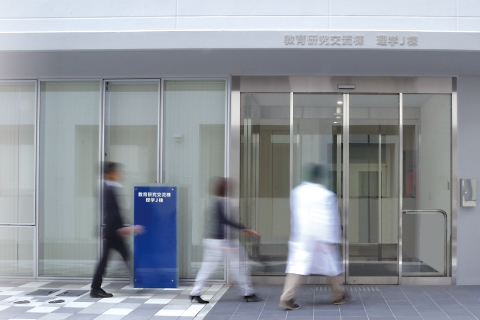

Challenging germinal research
to advance basic science
The Osaka University School of Science and Graduate School of Science, as an entity for the advancement of basic science in the spirit of Dr. Hantaro Nagaoka, the first president of Osaka University, and his admonition“Souhaku wo Namuru Nakare (Originality and Inspiration) ”, is engaged in world-leading research in basic science.
In conjunction with new discoveries of knowledge and understanding, and with new concepts of material, the school cultivates researchers who can carry forward next-generation basic research and others capable of acting internationally as scientifically grounded leaders in society. Therefore, research activities in the Graduate School of Science are centered on basic and germinal research and progress with a long-range view marked by the main approach of freedom in free individual thought and creative conceptualization.
Among these activities, those that lead to major achievements and promise further growth are supported by large-scale competitive funding. Since the implementation of such large-scale project research requires near-term human and equipment investment, it has been difficult to assimilate such efforts with the conventional approach of a traditional Graduate School of Science. However, such project research supported by the Graduate School of Science shows a direction for further development of basic science. On October 1, 2011, the Project Research Center for Fundamental Sciences, which has open laboratories and a special environment for radioactivity, was established for large-scale project research and related activities.
On July 1, 2015, the Project Research Center for Fundamental Sciences was reorganized to implement challenging and creative research, cultivate germinal research, create new fields in new collaborations, and strengthen the impetus of university–industry co-creation, as well as large-scale project implementation. This reorganization enabled the advancement of the Graduate School of Science-led mid- and long-range projects by the Project Research Division as well as a new framework for the advancement of challenging and germinal research by the newly established Challenging Exploratory Research Division. “Cores” have been established so that free and growing research can cross departments and organizations. Efforts in progress include ERATO, ImPACT, the Program on Open Innovation Platform with Enterprises, Research Institute and Academia (OPERA) budgetary request project, “ the Project for Advanced Cancer Treatment by Medicine and Science Collaboration” budgetary request project, “ the Project for New Medical Innovations in the Institute for Radiation Sciences”, and other large-scale projects and interdisciplinary research programs that have produced remarkable achievements.
In this way, this center has strengthened the system enabling the advancement of cutting-edge research and is establishing an environment for creative basic research worthy of future Nobel Prizes.